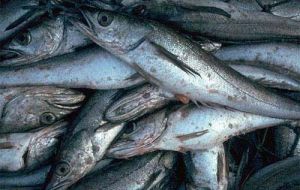MercoPress. South Atlantic News Agency
Scientific report exposes Argentina’s passiveness with fisheries depredation
 Tons of hake are daily tossed back to sea as waste
Tons of hake are daily tossed back to sea as waste A chain email is circulating among citizens of Argentina that seriously questions the stance of the national government regarding fisheries ordinance and the treatment of seafood resources.
The email features a report authored by Alicia Jardel, collaborating professor for Investig'Action Belgium, who begins censuring the “disastrous idea” of the Argentine Secretariat of Agriculture, Livestock and Fishing “of withdrawing inspectors who board fishing vessels and fresh fish vessels that target shrimp, exchanging them for mere 'observers,' with an almost null policing power.”
Two other “unfortunate situations” compound that fact. First of all, the arrival of “highly depredatory” deep freezer vessels of large Spanish companies that migrated to Argentina after they were expelled from the seas of the then-European Economic Community.
Secondly, it mentions that in the 1990s, provincial authorities of Santa Cruz and Chubut “completed the circle” in allowing foreign factory ships to toss overboard fish they were not targeting.
As factory ships that target shrimp ( Pleoticus muelleri) they are only interested in that species because of its international price. They then discard major amounts of common hake (Merluccius hubbsi), dogfish, cod, ray and salmon caught in their nets.
The species are returned to sea, often dead -- such as hake -- without being used to feed thousands of Argentine citizens. According to the researcher, about 100 boats of 40 and 50 meters in length throw about 10,000 kilos of hake into the sea daily.
That is, a million kilos of fish per day, given the inaction and passivity of Argentine fishing authorities.
Although the maritime depredation was denounced on several opportunities by sailors that are not members of the United Maritime Workers Syndicate (SOMU), the central government and the governors of the provinces of Santa Cruz and Chubut continue to avoid addressing the situation, Jardel says.
She affirms that the same is happening with fishing executives, who prefer not to hire personnel of Argentine origin onboard, choosing Peruvians or Bolivians, who do not complain about the depredation of the continental platform.
Jardel mentioned that Argentine politicians only decided to lower income taxes so that fish processing plants would earn more and stop protesting.
The situation tends to worsen since discarded resources serve as food for albatross and seagulls, which have reproduced in excess. According to biologists of the Patagonia Environmental Studies Centre (CENPAT), penguins of Punta Tombo, Chubut, must compete for food with other Patagonian marine birds, which have virtually doubled since 1990. (FIS)




Top Comments
Disclaimer & comment rules-

Read all commentsScientific report exposes Argentina’s passiveness with fisheries depredation.
Oct 05th, 2009 - 08:05 pm 0Why don't you have this article in Spanish?
Commenting for this story is now closed.
If you have a Facebook account, become a fan and comment on our Facebook Page!